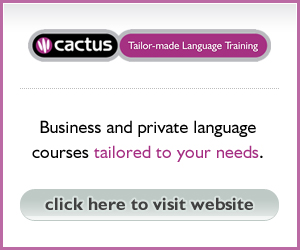Quality Stamp
Cactus is a language training organization which both offers its own public and private language courses as well as working with partner organizations from around the world to offer you a range of in-country school locations. The majority of the group courses offered from around the world on this site use our long-standing network of partner schools.
But how can we guarantee their quality, if we are not running the courses ourselves?
How we review partner school quality
At Cactus, we are aware that there are thousands of schools around the world teaching hundreds of languages, and we are determined to work with as wide a range as possible, on condition that they are of a suitable quality. We are interested in value for money for all our clients, although this does not always mean the lowest possible price at the cheapest available language centre.
You may occasionally find lower prices elsewhere; however, we guarantee that all our schools which you find on the website have been checked by Cactus, either through a personal visit by Cactus staff, or by extensive research, telephone interviews and a full review of course and accommodation options. Since 1998 we have been dealing with partner school organizations and for this reason we have developed a considerable amount of expertise, not to mention some very strong partnerships. Our in-house Cactus Quality Programme also ensures that client feedback has a direct influence on how we work with our schools, and years of consistent recommendation is probably the best way of helping us shape the range of courses and schools on offer to you.
How we assess our partner schools
During a visit to our partner school, we assess the following criteria, to see if they meet our quality standards.
1. Practical location – Whether in a city, town or resort, the school has to be well-situated and easily found.
2. Quality of teaching establishment – Where possible, we look for evidence of membership of the appropriate national accreditation board. Affiliation to associations - Accreditation by suitable national or international association. Membership of provincial or countrywide association. For example British Council in the UK, FIDELE in Spain, FLE in France.
3. Teacher quality – An assurance that trainers are qualified, native speakers, with relevant experienced teachers and an excellent track record. Many of us at Cactus are qualified trainers, and able to assess teaching quality by observation.
4. School premises - Quality of building & decoration of classrooms, offices, cafeterias etc.
5. Additional facilities - Refreshments, libraries, self-study rooms, multimedia & IT services, other learning aids.
6. Accommodation - Variety of options including host family (where possible). Accommodation placement & supervising officer.
7. Activities - Variety & frequency of cultural and social activities Teacher involvement.
8. Supplier relationship - Rapport with school staff particularly contact point. Efficiency of correspondence in respect of clients and possible complaints
9. Range of courses. Variety & frequency of courses. Range of language levels, ability to start courses at regular intervals.
10. Pastoral care – Evidence of good support for client requirements, and past experience of a strong ability to manage client concerns quickly, effectively and to the satisfaction of the client.
11. Health & Safety- Assurance that the school complies with all relevant health & safety and other legal requirements, such as fire safety, indemnity insurance, etc.
12. Positive Client feedback – We check client satisfaction on Day 3 of the course and again at the end of the course. This helps us build an accurate picture of the quality of the school and the learning experience as seen through the eyes of our clients.
